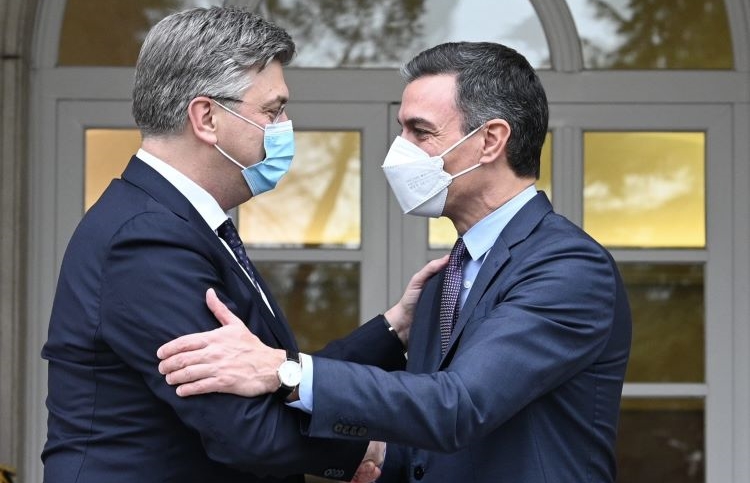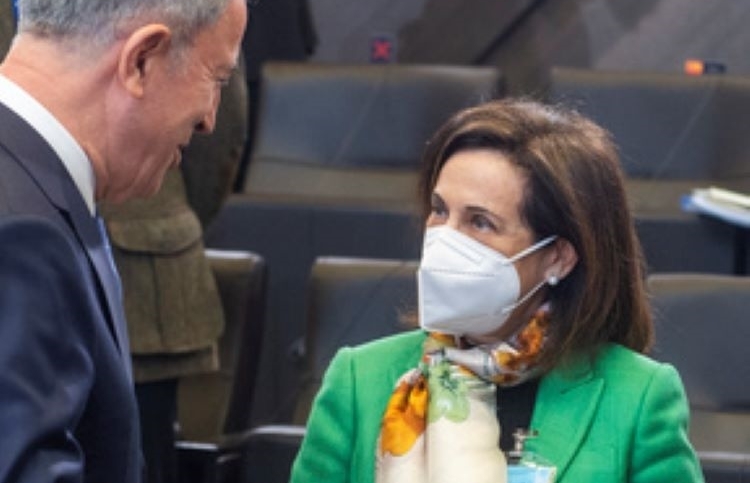The Diplomat
The President of the Government, Pedro Sánchez, received yesterday at La Moncloa the Prime Minister of Croatia, Andrej Plenkovic, to whom he expressed Spain’s support for his country’s entry into the Schengen area and the Eurozone and its solidarity after the recent fall of a drone with explosives in Zagreb.
Plenkovic’s visit, the first by a Croatian prime minister to Spain in 25 years, is framed “in the interest of boosting the bilateral relationship between Spain and Croatia in the month in which the 30th anniversary of the establishment of diplomatic relations between the two countries is being celebrated”, according to Moncloa.
During the meeting, the two heads of government coincided in their “resounding condemnation of the cruel war in Ukraine” and in their support to the Ukrainian people and Pedro Sánchez expressed his solidarity to Andrej Plenkovic for the recent fall of a drone loaded with explosives in Zagreb, which could have meant a “real calamity” for the Croatian society, an event whose circumstances are still being clarified.
“We have to be even more alert”, since “we are facing a war and it is a real threat for all the allies”, declared the President of the Government, who warned that, just as it happened in Zagreb, this same incident could also have occurred in Madrid. For his part, the Croatian prime minister showed his government’s discomfort with this event and recalled that the drone had flown over both Romania and Hungary without triggering the alerts, despite being a 40-meter and six-ton device. In any case, he was pleased that there had been no casualties and added that, for the moment, it is not known “whether it was an accident, sabotage or a premeditated act”.
Sánchez and Plenkovic also stressed the need to further strengthen bilateral ties and the Prime Minister expressed his support for Croatia in its process of accession to the Schengen area and the euro. “We are determined that the EU should be that project of peace, coexistence and progress in which our brothers in the Western Balkans are reflected, whom we will continue to accompany in the reforms necessary to achieve their accession,” said the Prime Minister.
Likewise, the two heads of government also addressed “the need to halt the escalation of energy prices, with the conviction that the next European Council has to react clearly and definitively to protect our citizens and companies”, as stated by Sánchez at the subsequent press conference.
Slovakia
Precisely, hours after this meeting, Sánchez travelled to Slovakia to meet and hold a working dinner with the Prime Minister of this country, Eduard Heger, as part of the tour undertaken yesterday by the President of the Government by several European partners to address the problem of energy prices before the European Council on March 24 and 25. Spain’s objective is for the 27 to modify the current energy price market by separating the price of gas from that of electricity, to make joint purchases, to diversify supply and to commit to renewable energies. The debate on this issue began last autumn, but has taken on a new dimension with the invasion of Ukraine and the EU’s attempts to minimize energy dependence on Russia.
During the joint press conference after meeting with Heger in Bratislava, Pedro Sánchez stated that, “at this critical moment”, the EU has to “step forward and share decisions that we previously thought were not necessary”, especially in foreign and security policy, and affirmed that Spain can contribute in a “decisive” way to the European energy market and to ending Russian dependence “with its liquefied gas and gasification capacities”, so that “everything can be interconnected”. “It is not the only one of the solutions, we need to increase the number of suppliers and alternative energy sources to gas. We need to make a structural reform in the market that decides the price of electricity,” he added.
For his part, Heger said that during his meeting with Sanchez they had talked about “looking for other solutions so that there will never be a lack of gas, although we will also discuss oil and technology, which here in Slovakia is very much oriented towards Russia.” “We have managed to join Ukraine to our supply network; it is a sign of help towards the country and thus Ukraine will be able to disconnect from the Russian supply network,” he assured.







